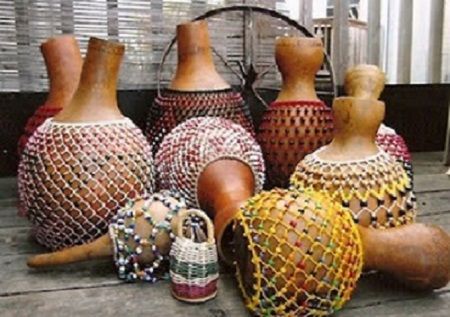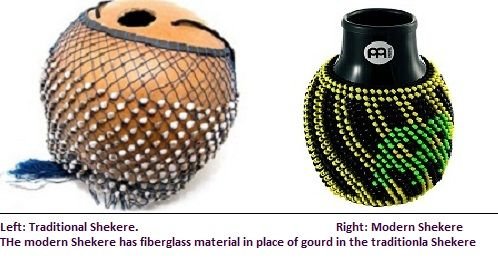African people have always been identified with very interesting and beautiful culture from ages. Their culture reflects in the way they talk, dress, live in their communities and even in their MUSIC.
African traditional music is made of lovely sounds of many percussion instruments that makes it very unique. Most of the percussion instruments used in African music are made from materials like animal horns, hoofs, shells, wood trunks etc. One of my favorite musical instrument in African traditional music is Shekere (a percussion instrument that is rattled to produce sound).

I always love the sound of Shekere in African music because it’s dinstinct and I am fond of looking for it in Africa musical band because it’s such a beautiful masterpiece of art. It is actually called Shekere among the Yoruba people in Africa while the bigger ones can sometimes be referred to as Agbe.
Shekere is said to have originated from West Africa and it is found mainly in traditional music in countries like Nigeria, Ghana, Liberian, Senegal and some other countries. Histories also has it that it was transported to America during the trans-Atlantic slave trade era and toady it can be seen in countries like Brazil and Cuba. This beautiful percussion instrument has many other names in places where it is found outside the Yoruba States. In Ghana it is called Axatse, in guinea it is called Djabara, in Libearia it is called Ushaka, in Brazil it is called Xequere while in Cuba it is called Chekere.
Shekere is traditionally made from a hollow dried gourd covered on the outside with net of beads though some other variants have seeds, shells, cowries or any other material that can make coordinated rattle sound in place of beads.
As with technology comes new ways of doing things, the gourd is replaced with fiberglass material in modern Shekere and this is far more durable than gourds used in making Shekere traditionally. Aside from durability, many people prefer the traditional Shekere than the modern ones even because of the gourd.

Shekere is sometimes played alone to give melody to folksongs while big musical bands usually use it to form the base sound for their music. The sound is very lovely and the look of Shekere adds so much artistic beauty to musical bands. In some traditional music, dancers would hold colorful Shekeres and dance in a chorographic pattern to the rattling sound that is complemented by the sound of other percussion instruments. The rattling sound most times precede other musical instruments’ sounds and it prepares the listening atmosphere for music and listeners minds come alive for music when the rattling sound starts playing
Shekere is awesomely colorful and the rattling sound is amazingly lovely especially when you have it in your hand and you can feel it while playing. It is always amazing to see how Shekere is rattled to produce such a lovely, coordinated and danceable sound and that is why I call Shekere the DANCING GOURD IN A BEADED SKIRT. And I think that’s kind of interesting too.
Kindly upvote and follow @nezer for more if you like this article. I will be glad to respond to your comments as well. Thank you for reading.
sources:
blog.africaimports.com
ibiblio.org
Congratulations! This post has been upvoted from the communal account, @minnowsupport, by nezer from the Minnow Support Project. It's a witness project run by aggroed, ausbitbank, teamsteem, theprophet0, someguy123, neoxian, followbtcnews, and netuoso. The goal is to help Steemit grow by supporting Minnows. Please find us at the Peace, Abundance, and Liberty Network (PALnet) Discord Channel. It's a completely public and open space to all members of the Steemit community who voluntarily choose to be there.
If you would like to delegate to the Minnow Support Project you can do so by clicking on the following links: 50SP, 100SP, 250SP, 500SP, 1000SP, 5000SP.
Be sure to leave at least 50SP undelegated on your account.
Downvoting a post can decrease pending rewards and make it less visible. Common reasons:
Submit